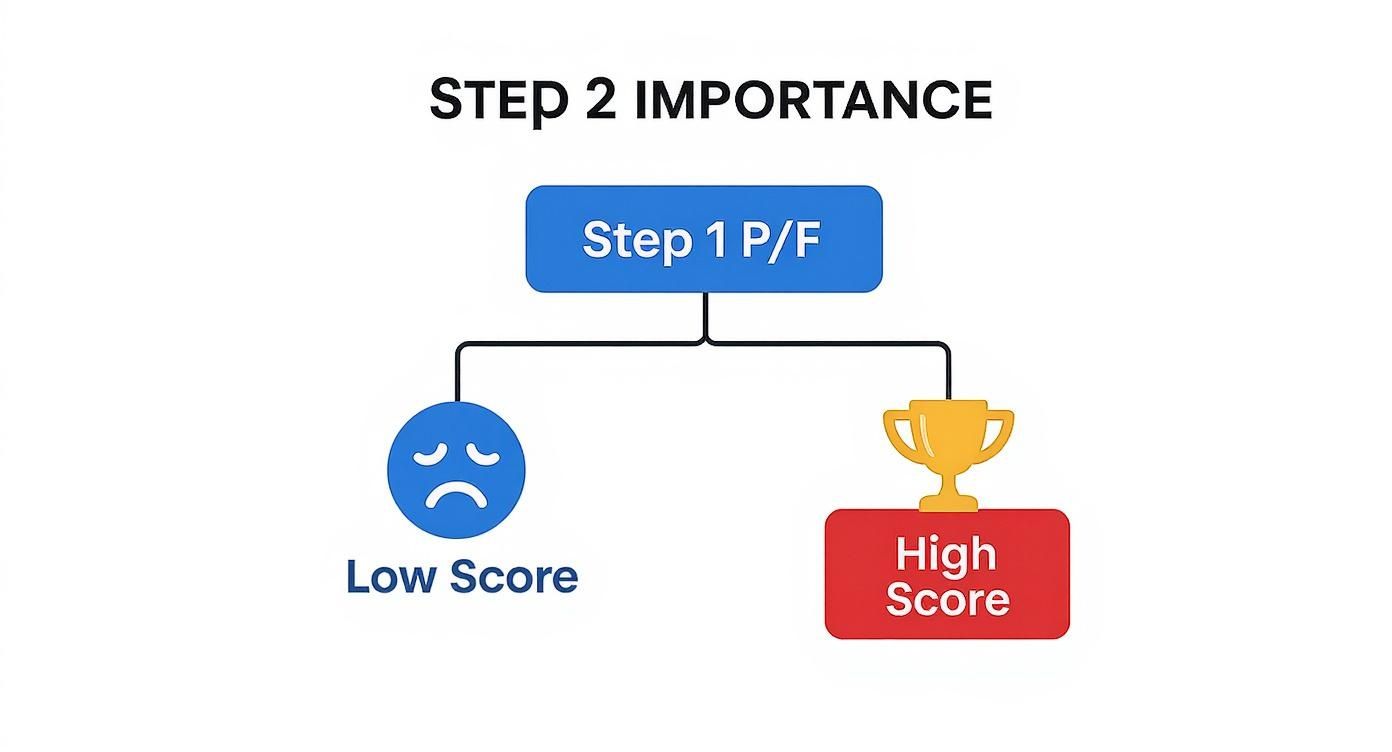Most medical students find the sweet spot for taking USMLE Step 2 is after completing their core clinical rotations. This usually means late in your third year or early in the fourth. Why? Because it allows you to capitalize on all that fresh, hands-on clinical knowledge from your clerkships, turning recent patient encounters into a massive advantage on exam day.
Decoding the Best Time to Take USMLE Step 2

Figuring out when to take USMLE Step 2 isn't just about finding an open date—it's a critical strategic decision that can directly shape your residency application. Think of your core clinical rotations as an intense, year-long dress rehearsal. Taking the exam right after is like stepping on stage when every line is still sharp in your mind. This isn't just a suggestion; it's a battle-tested strategy.
Over the past decade, there's been a clear shift. The vast majority of students now sit for the exam during or immediately after their clerkships. This alignment has paid off beautifully. Performance data shows that first-time takers from US and Canadian MD programs are hitting a pass rate of around 98%. You can dig deeper into the USMLE performance data to see just how much timing impacts success.
Comparing Your Timing Options
To pick the right path for you, it helps to lay out the trade-offs between the different scheduling windows. Each one comes with its own set of pros and cons, mostly revolving around knowledge retention and those all-important application deadlines.
The real goal here is to get your peak clinical knowledge to line up perfectly with the residency application cycle. Schedule it too early, and you might not have finished high-yield rotations. Wait too long, and you risk a nail-biting delay in getting your score submitted for ERAS®.
Here's a quick breakdown to help you visualize the most common timing options and what they entail.
USMLE Step 2 CK Timing at a Glance
This table compares the three most common windows for taking Step 2 CK, highlighting the strategic trade-offs of each approach.
| Timing Window | Primary Advantage | Potential Challenge |
|---|---|---|
| End of Third Year | Knowledge from core rotations is incredibly fresh, leading to higher retention. | Juggling dedicated study with your final clerkship duties can be incredibly intense. |
| Early Fourth Year | Gives you a dedicated study period without overlapping clinical responsibilities. | You may be several months removed from key rotations like medicine or surgery. |
| Mid-Fourth Year | Provides maximum time for sub-internships and advanced electives before the exam. | Puts immense pressure on meeting score reporting deadlines for residency applications. |
Ultimately, the best choice depends on your personal study style, clinical schedule, and how confident you feel coming out of your core rotations. Weigh these options carefully to set yourself up for success.
Why Step 2 Timing Matters More Than Ever
With the USMLE Step 1 exam now a simple pass/fail, your Step 2 CK score has been thrust into the limelight. It's no longer just another box to check—it's become the single most important academic number on your residency application.
Think of it like a stage performance. Before, you had two spotlights on you: Step 1 and Step 2. Now, the Step 1 light has been switched off, making the spotlight on your Step 2 score incredibly intense and focused.
This one three-digit number is one of the few objective tools program directors have left to sort through a sea of incredibly talented applicants. Timing your exam perfectly to lock in a high score can dramatically boost your interview invitations and directly shape your Match outcome.
The New Filter for Residency Applications
The moment Step 1 went pass/fail in 2022, the game changed. Residency programs, desperate for a standardized way to compare candidates from different schools, immediately shifted that weight onto Step 2 CK.
According to a recent survey of program directors, Step 2 CK scores are now the fourth most frequently cited factor when deciding who gets an interview. You can read more about its growing importance on the AMA's website.
This means the question of when to take USMLE Step 2 is more critical than it's ever been. It's not a hurdle you just need to clear; it’s a strategic opportunity that can define your entire medical career.
Your Step 2 CK score is your new academic first impression. A strong performance can open doors to competitive specialties and top-tier programs, while a weak one can close them just as quickly.
Connecting Your Score to Your Specialty
Let's be clear: not all specialties view Step 2 scores the same way. A competitive field like dermatology or plastic surgery will have a much higher average score for matched applicants than a less competitive one.
Because of this, your timing strategy has to align with the score you actually need for your dream specialty. You have to know the benchmark. For a complete breakdown, take a look at our guide on Step 2 scores by specialty.
Ultimately, a well-timed exam lets you test when your clinical knowledge is at its absolute peak, ensuring your application is as powerful as possible when it lands in front of program directors.
Factors That Shape Your Ideal Test Date
Figuring out when to take USMLE Step 2 isn't about just grabbing an open spot on the calendar. It's a strategic move, and your perfect date hinges on balancing three critical pillars: your clinical rotation schedule, your dedicated study time, and those all-important residency application deadlines.
Think of it like building a tripod. If any one of those legs is shaky, the whole thing comes crashing down. Let's break down how to get them all working together.
Completing Your Core Clerkships
Your core clerkships are the bedrock of your Step 2 prep. The hands-on experience you get from seeing patients in internal medicine, surgery, pediatrics, and OB/GYN is pure gold. These rotations aren't just a requirement; they directly cover the highest-yield topics you'll face on exam day.
When you finish these key rotations right before sitting for the test, the material is fresh and loaded with real-world context. You’re not just trying to recall facts from a textbook—you're remembering actual patient cases, which makes your clinical reasoning sharper and helps the information stick. Waiting until you have these experiences under your belt gives you a massive advantage.
Securing Dedicated Study Time
The next critical piece of the puzzle is carving out a protected, dedicated study period. This is a non-negotiable block of time—usually four to six weeks—where your only job is getting ready for this exam. It's your boot camp before the big game.
During this window, you'll be grinding through question banks, shoring up your weak spots, and taking practice exams to build your mental stamina. If you want to get the most out of those practice tests, check out this guide on the best ways to use NBME practice exams for Step 2. Trying to cram studying in while you're on a demanding rotation is a recipe for burnout and a score you won't be happy with.
The infographic below really drives home how much your Step 2 score matters now that Step 1 is pass/fail.

As you can see, a high Step 2 score has become one of the most important ways for residency applicants to stand out.
Meeting Residency Application Deadlines
Finally, you have to work backward from the Electronic Residency Application Service (ERAS) deadlines. Program directors start downloading and reviewing applications on a specific date in late September. To be a competitive candidate, your Step 2 score needs to be in your application on that very first day.
Keep in mind it takes roughly two to four weeks to get your score report back after you take the exam. To play it safe, you should plan to sit for your exam no later than mid-to-late August.
This timeline ensures that when program directors open your file, they see the whole picture—including an impressive Step 2 score—right from the get-go. Getting these three factors to line up is the secret to building a smart, personalized, and successful Step 2 strategy.
How to Structure Your Dedicated Study Period

This is it. Your dedicated study period is the final training camp before the championship game. The goal isn't just to cram for hours on end; it's about smart, focused, and high-yield prep. Think of yourself as an athlete fine-tuning your performance—every single study session needs a purpose.
You need a realistic, sustainable weekly schedule that juggles your most important resources. This means finding a rhythm that works for you, balancing deep dives into UWorld question blocks, reviewing content to patch up knowledge gaps, and taking full-length practice exams. A solid plan is your best weapon against feeling completely overwhelmed. For a detailed look at how to build this out, check out our sample Step 2 CK study schedule.
Building Stamina and Managing Time
One of the sneakiest challenges of Step 2 prep is building the mental stamina for a nine-hour exam. It's a marathon, not a sprint. The only way to train for it is to simulate race day, which means taking a full-length practice test at least once a week under timed conditions. This builds endurance, hones your time management under pressure, and dials down the anxiety when the real day arrives.
To get the most out of your dedicated period, you'll need to apply some actionable time management tips for students. These strategies are gold for breaking down massive study blocks into pieces you can actually tackle while staying focused for weeks on end.
Your dedicated period is as much about psychological preparation as it is about academic review. Protecting your mental health isn't a luxury; it's a core component of peak performance.
Finally, you absolutely have to schedule breaks and guard your sleep with your life. Burnout is the number one enemy of a high score. Make time for things that help you decompress, whether that’s hitting the gym, hanging out with friends, or just unplugging completely for a few hours. Showing up on test day rested and sharp is just as critical as knowing the difference between cellulitis and erysipelas. A focused mind is your greatest asset.
Common Scheduling Mistakes and How to Avoid Them

Learning from the mistakes of those who have gone before you is one of the smartest things you can do in medicine. When it comes to scheduling Step 2, a few classic blunders can add a ton of stress to your application season and even put your Match chances at risk.
The most common pitfall? Taking the exam before you've finished your most important core rotations. Jumping the gun before you've completed internal medicine or surgery is like trying to diagnose a patient without a history and physical—you’re missing the essential, foundational context that only real patient care can provide.
Another huge error is simply not giving yourself enough time for dedicated study. Many students think a couple of weeks will cut it, but a proper four- to six-week dedicated period is crucial for pulling all that knowledge together and building the stamina this marathon exam demands.
Critical Timing Errors to Sidestep
To keep your residency application safe, you have to avoid scheduling choices that could delay your score. These might seem like small details, but they can have massive consequences once program directors start clicking through applications.
- Scheduling too close to the deadline. Booking your test for early September is a high-stakes gamble. Scores can take two to four weeks to come back, leaving zero wiggle room if there's even a slight delay. That could mean programs see your application without a score.
- Ignoring clerkship order. Don't plan your exam right after a lighter rotation. You want your most content-heavy clerkships, like internal medicine, to be fresh in your mind. Try to place them as close to your dedicated study block as you can.
The goal is to have a complete, polished application ready for review on day one. A missing Step 2 score can be an immediate red flag, potentially bumping your file to the bottom of the stack before anyone has even looked at it.
Steering clear of these traps ensures all your hard work is reflected in your application right when it matters most.
Frequently Asked Questions About Scheduling Step 2 CK
Even with a perfect plan in hand, specific questions always pop up when it's time to actually book your exam. Here are some straightforward answers to the common logistical hurdles students run into when trying to pin down a date for USMLE Step 2.
How Far in Advance Should I Register?
You’ll want to register for Step 2 CK at least three to six months before you hope to test. It sounds like a lot of time, but Prometric testing centers fill up shockingly fast, especially during the peak season in late spring and early summer.
Getting registered early is your best move to lock in the date and location you want, which seriously cuts down on last-minute stress. Remember, it's a two-step process: first, get your scheduling permit from NBME or ECFMG, and then book your actual test day with Prometric.
Can I Take Step 2 CK Before Step 1?
While some unique curricula might technically allow this, it's a move that's strongly discouraged by pretty much everyone, and for good reason. The medical school journey is designed to build your foundational science knowledge with Step 1 before you're asked to apply it clinically for Step 2.
Taking Step 2 first is like trying to read a novel's sequel without ever opening the first book. You'd be missing all the fundamental context and scientific principles you need to effectively reason through complex clinical vignettes.
What Happens if I Need to Postpone My Exam?
Life happens, and postponing your exam is definitely an option. The key is to pay very close attention to the fees and deadlines set by the NBME and Prometric, because the rescheduling fees get steeper the closer you get to your test date.
- More than 31 days out: This is often free or comes with a minimal fee.
- Within 5 days of the exam: Moving your date this late will come with a significant financial penalty.
Pushing back your exam is always a better choice than walking in unprepared and failing. Just be sure you’re doing it for the right reasons. Always check the official USMLE website for the most current fee schedule before you make a change. A strategic delay is far smarter than a rushed attempt that doesn't reflect your true abilities.
Navigating the complexities of board prep takes more than just a calendar. If you need personalized guidance on building a study timeline that truly maximizes your score, explore the expert tutoring options at Ace Med Boards. Get a free consultation today!
